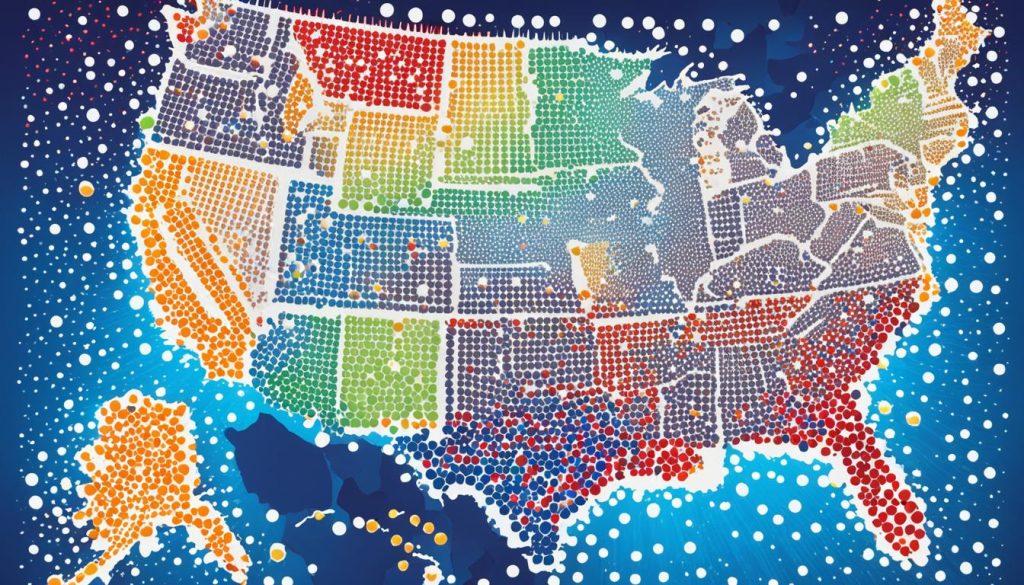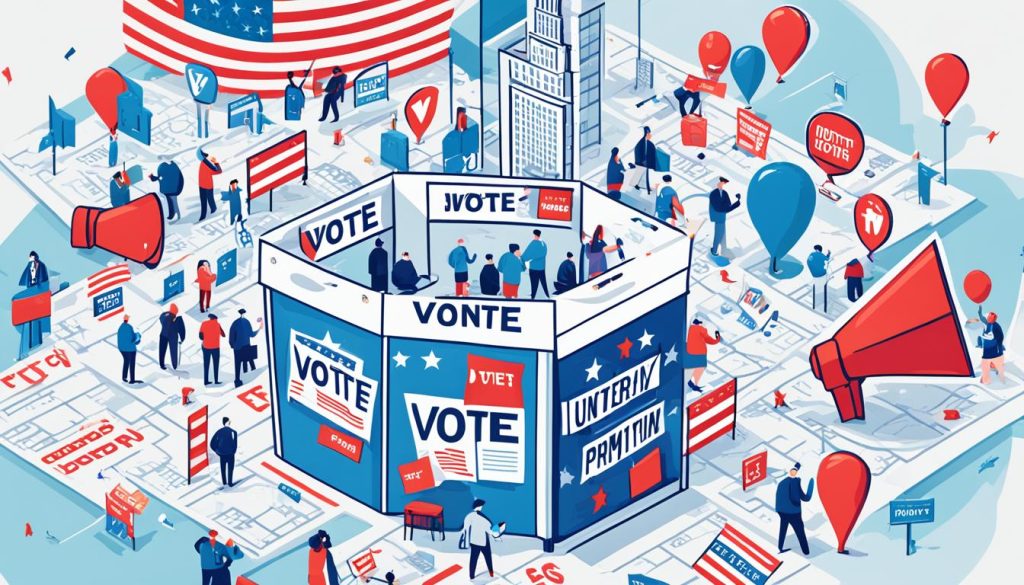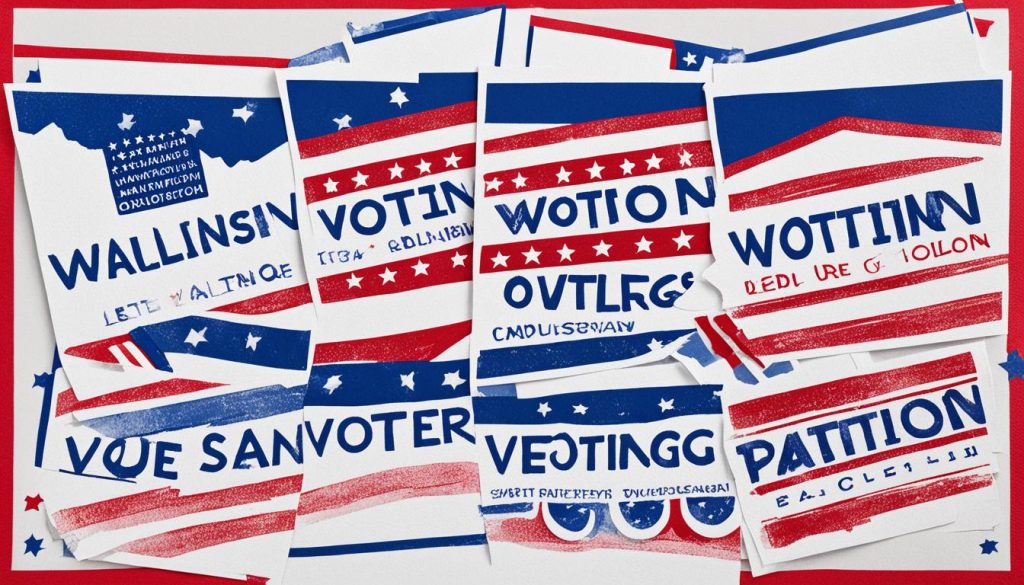Welcome to Super Tuesday, the pivotal day in the US presidential primaries where voters across the country cast their ballots in a multitude of states and territories. It is a day of great significance for political elections, as the outcomes can shape the future of the Democratic and Republican parties, influence delegate allocation, and provide valuable insights into the dynamics of the primary race.
While this year’s Super Tuesday might not directly impact the rematch between President Biden and former President Trump, it remains an important milestone for House and Senate control, as well as crucial governor races. So, whether you’re a political enthusiast or a concerned citizen, follow along as we delve into the intricacies of Super Tuesday and its implications for the wider US elections.

Key Takeaways:
- Super Tuesday is a significant day in the US presidential primaries, where voters across multiple states and a territory participate in political elections.
- The outcomes of Super Tuesday can influence delegate allocation, party dynamics, and emerging trends within American politics.
- While the impact on the presidential race may vary, Super Tuesday provides valuable insights into candidate performances, campaign strategies, and shifting dynamics within parties.
- Key states like California and Texas, with a large number of delegates at stake, hold particular importance in shaping the overall outcome of Super Tuesday.
- Stay tuned for the results and analysis that will shape the future of US elections!
What is Super Tuesday?
Super Tuesday is a momentous day in the presidential primaries, marking a significant milestone in the race for the White House. On this pivotal day, numerous states across the country hold their presidential primaries, allowing a large number of delegates to be allocated to the candidates. Super Tuesday is a crucial event that can shape the course of the entire primary season.
This year, Super Tuesday takes place in 15 states and one territory, with voters from Alabama, Alaska, Arkansas, California, Colorado, Maine, Massachusetts, Minnesota, North Carolina, Oklahoma, Tennessee, Texas, Utah, Vermont, Virginia, and American Samoa participating in this highly anticipated voting day.
Super Tuesday presents a unique opportunity for candidates to amass a significant number of delegates and gain considerable momentum in the race for their party’s nomination. It is a critical test for presidential hopefuls as they seek to earn the support and votes of voters across a wide range of states.
By holding their presidential primaries on the same day, Super Tuesday allows for a clearer picture of the candidates’ popularity and viability. It often marks a turning point in the primary season, influencing the strategies and positions of the candidates moving forward.
“Super Tuesday is a pivotal moment in the presidential primaries, where candidates have the chance to demonstrate their appeal across multiple states and showcase their ability to garner significant support.”
States and Territories Participating in Super Tuesday
Super Tuesday brings together voters from various states and territories, making it a crucial day in the US presidential primaries. On this day, voters in 15 states and one territory cast their ballots to determine the allocation of delegates. The participating states are:
- Alabama
- Alaska
- Arkansas
- California
- Colorado
- Maine
- Massachusetts
- Minnesota
- North Carolina
- Oklahoma
- Tennessee
- Texas
- Utah
- Vermont
- Virginia
In addition to these states, American Samoa, a US territory, also holds its presidential primary on Super Tuesday.
Insights from Participating States
Each participating state brings its unique political landscape and demographics to Super Tuesday. The results from these states provide valuable insights into the preferences of voters across different regions and the overall sentiment within the respective parties. Understanding the dynamics of each state is crucial for the candidates aiming to secure the nomination.
“Super Tuesday gives a snapshot of how candidates are performing in a diverse range of states, helping to gauge their appeal and potential success in the general election.” – Political Analyst
Interesting Primaries to Watch
While this year’s Super Tuesday may not significantly impact the presidential race, there are still noteworthy primaries worth watching. These include contests that could affect the control of the House and Senate, as well as important governor races. These primaries could have significant implications for the future political landscape of the United States.
- House and Senate Control: Keep an eye on the primary races that could sway the balance of power in the House of Representatives and the Senate. The outcomes of these races will determine which party controls the legislative branches of the government.
- Important Governor Races: Several states have high-stakes gubernatorial elections on Super Tuesday. The results of these races will determine the leadership and policies of these states, impacting key issues such as healthcare, education, and economic development.
- Noteworthy Primaries: Some primaries might feature compelling candidates or intriguing storylines that capture public attention. From tight races to unexpected upsets, these contests can provide insights into the shifting dynamics within political parties and the priorities of voters.
“By closely following these primaries, we can gain valuable insights into the direction of our nation’s politics and anticipate potential shifts in power and policy.”
As the primary season unfolds, Super Tuesday serves as a critical juncture in the electoral process, guiding the future trajectory of political campaigns and shaping the nation’s future.

The Candidates’ Perspectives
On Super Tuesday, all the presidential candidates from the Democratic and Republican parties will be closely observing the results. While the focus is primarily on the allocation of delegates, the outcomes of the primaries can provide valuable insights into each candidate’s strengths and weaknesses and help shape their campaign strategies moving forward.
The Democratic Party candidates, including President Joe Biden and Vice President Kamala Harris, will be monitoring their performance across the participating states. Super Tuesday serves as a critical opportunity for candidates to gauge their popularity and appeal to voters on a national scale. It can also highlight any regional disparities in support, allowing candidates to tailor their messaging and campaign efforts accordingly.
“Super Tuesday is an important milestone in the primary process, and we are excited to see how voters respond to our message of unity and progress for all Americans. We recognize the significance of this day and the potential impact it can have on the future of our campaign,” says President Joe Biden.
The Republican Party candidates, which may include former President Donald Trump and prominent figures from the party, will also closely follow Super Tuesday results. While President Trump may not face significant primary challenges, ensuring strong results in key states can solidify his support base and rally the party behind his leadership.
“Super Tuesday is an opportunity for Republicans to demonstrate our continued commitment to conservative values and policies that have benefited millions of Americans. We will be closely watching the results as we work towards securing a strong Republican victory in the general election,” states a spokesperson for the Republican Party.
Super Tuesday serves as a platform for candidates to assess public opinion, fine-tune their campaign strategies, and seize opportunities to stand out in a crowded field. The outcomes of the primaries can also shape the media narrative surrounding the candidates, influencing coverage and public perception leading up to future primaries and caucuses.
As the candidates analyze the results and their standing among voters, they will adapt their messaging, campaign tactics, and focus on appealing to the demographics and regions where they have the most potential for success. Super Tuesday acts as a key benchmark in the race for the presidential nominations, setting the stage for the next phase of the primary process.
Key Takeaways:
- Super Tuesday is a crucial day for all presidential candidates to assess their performance and campaign strategies.
- The Democratic Party candidates will be closely monitoring their nationwide appeal and regional variations in support.
- The Republican Party candidates will aim to solidify their support base and rally the party behind their leadership.
- The outcomes of the primaries on Super Tuesday can shape media coverage and public perception leading up to future contests.
- Candidates will adapt their campaign tactics based on the analysis of the results, focusing on demographics and regions where they have the most potential for success.
The Importance of Delegates
Super Tuesday is a crucial day for delegate allocation, making it a pivotal moment in the presidential nomination process. Delegates hold significant power as they contribute to the final decision of each party’s presidential candidate. Winning a substantial number of delegates on Super Tuesday can give candidates the momentum they need to influence the trajectory of their campaigns.
Delegates play a vital role in determining the nominee for each party by casting their votes at the national convention. The number of delegates allocated to each state is based on factors such as population, past election results, and party rules. Super Tuesday, with its wide array of participating states, offers an opportunity for candidates to accumulate a substantial number of delegates in one fell swoop.
Being successful on Super Tuesday can have a domino effect for candidates, generating media attention, donor support, and additional endorsements. It sets the tone for the rest of the primary season, shaping the narrative surrounding the candidates’ viability and electability.
“Super Tuesday can make or break a candidate’s chances of securing the party’s nomination. A strong showing on this day can propel a candidate forward, while a disappointing performance can be detrimental to their campaign,” says political analyst Lisa Thompson.
Many candidates strategize extensively for Super Tuesday, allocating resources and focusing their campaigning efforts on states with large delegate counts. They aim to secure as many delegates as possible to strengthen their position in the race and build momentum going forward.
It is crucial for candidates to carefully consider their Super Tuesday strategies, targeting key states where they have a strong base of support and can potentially secure a significant number of delegates. By doing so, they can position themselves as frontrunners and gain an edge in the presidential nominations process.
Delegate Breakdown by Party
Here is an overview of the delegate breakdown for the Democratic and Republican parties in the 2024 presidential primaries:
| Party | Total Delegates | Delegates Needed for Nomination |
|---|---|---|
| Democratic | 4,765 | 2,384 |
| Republican | 2,550 | 1,276 |
These numbers reflect the number of pledged delegates a candidate must win to secure their party’s nomination. Super Tuesday plays a significant role in the accumulation of these delegates and is a crucial stepping stone on the path to the presidency.
Overview of the Primary System
The primary system in the United States is a crucial aspect of the election process, allowing political parties to select their presidential candidates. Super Tuesday, with its extensive participation and influence, plays a key role in this system.
During the presidential primaries, voters across the country cast their ballots to express their support for a particular candidate in their party. The primary system covers a sequence of state-by-state contests held by both the Democratic and Republican parties.
Super Tuesday stands out as a particularly significant day in the primary calendar. It brings together numerous states on the same day, providing an opportunity for candidates to gain momentum or face setbacks. The results of Super Tuesday have the potential to reshape the political landscape and alter the trajectory of the primary race.
“Super Tuesday brings together numerous states on the same day, providing an opportunity for candidates to gain momentum or face setbacks.”
- Unlike a regular election day, Super Tuesday is a coordinated effort where multiple states hold their primaries concurrently. This consolidation allows the participating states to have a more substantial impact on the overall nomination process.
- Super Tuesday includes a diverse range of states, both geographically and demographically. From the populous states of California and Texas to the smaller yet influential states like Vermont and Massachusetts, the collective impact is significant.
- This consolidated approach of Super Tuesday offers voters a chance to have a direct say in shaping the outcome of their party’s nomination by giving their preferred candidate a substantial number of delegates.
The primary system, with Super Tuesday as its keystone, provides a platform for candidates to engage with voters, validate their appeal, and showcase their viability as potential nominees. It offers parties an opportunity to gauge public sentiment, assess candidates’ strengths and weaknesses, and ultimately determine who will represent them in the general election.
Key Information about the Primary System
| Aspect | Importance |
|---|---|
| Selection of Presidential Candidates | Crucial |
| Super Tuesday’s Role | Significant |
| Simultaneous State Primaries | Special Feature |
| Wide-ranging State Representation | Diverse Impact |
| Voters’ Direct Influence | Empowering |
| Platform for Candidates | Showcasing Viability |

Super Tuesday is a critical juncture in the primary process, paving the way for further developments and shaping the forthcoming stages of the presidential election. As voters participate and candidates vie for support, the primary system drives the democratic process, guiding the nation toward the final selection of its presidential nominees.
Key States and Races to Watch
While all the states participating in Super Tuesday are important, there are certain key states and races that stand out. These races not only have a significant number of delegates at stake but also provide insights into the current political climate and shifting dynamics within parties.
Key States
Two key states to watch on Super Tuesday are:
- California: With its large population and a whopping 415 delegates, California is a critical battleground. The outcomes here can have a substantial impact on the overall outcome of the primary race.
- Texas: As the second largest state in terms of delegates, Texas carries immense weight on Super Tuesday. The results here can shape the direction of the primary campaigns.
Competitive Races
Besides the key states mentioned above, there are numerous competitive races across the participating states. These races can provide key insights into the current political landscape and the shifting dynamics within parties. Here are a few examples:
North Carolina Senate Race: Republican Senator Thom Tillis is facing a tough re-election battle. The outcome of this race will be closely watched as it may impact the balance of power in the Senate.
Massachusetts Governor Race: Incumbent Governor Charlie Baker faces a challenge from within his own party. This race will be closely watched to see if Baker can secure his party’s nomination for another term.
These and other competitive races across the participating states will provide valuable insights into the current political climate and the level of voter engagement and enthusiasm.
Stay tuned for our complete coverage of Super Tuesday, where we will bring you the latest updates and analysis on the key states and races to watch. Don’t miss out on the exciting developments that will shape the future of the primary race and the overall political landscape.
Poll Closing Times and Expectations
Super Tuesday is a highly anticipated day in the US Presidential Primaries, with voters across 15 states and one territory casting their ballots. To get a sense of how the candidates are performing, it’s important to pay attention to the poll closing times and the subsequent release of state results. By following these timings, we can start to observe early trends and gain insights into the candidates’ performances in each state, contributing to the overall narrative of Super Tuesday.
“The timing of poll closures and the release of results on Super Tuesday can offer valuable insights into the strength of candidates and potential outcomes for the rest of the primary season.”
As the polls close at different times across the country, we can expect to see a gradual release of results throughout the evening and late into the night. By staying updated with these developments, we can analyze the impact of each state’s results on the candidates’ overall delegate count and their chances of securing the nominations.
To give you a clearer picture, here’s a breakdown of the poll closing times (all times are in Eastern Standard Time):
| State | Closing Time |
|---|---|
| Alabama | 8:00 PM |
| Alaska | 12:00 AM |
| Arkansas | 8:30 PM |
| California | 11:00 PM |
| Colorado | 9:00 PM |
| Maine | 8:00 PM |
| Massachusetts | 8:00 PM |
| Minnesota | 8:00 PM |
| North Carolina | 7:30 PM |
| Oklahoma | 8:00 PM |
| Tennessee | 8:00 PM |
| Texas | 9:00 PM |
| Utah | 10:00 PM |
| Vermont | 7:00 PM |
| Virginia | 7:00 PM |
| American Samoa | 12:00 AM |
Keep in mind that these times are subject to change, so it’s always a good idea to double-check closer to the date. As the results pour in, we’ll have a clearer view of the candidates’ performances and the potential impact on the rest of the primary race. Stay tuned for our analysis of the state results and their implications for the contenders.
Early Trends and Significance
Early results from Super Tuesday can provide valuable insights into the candidates’ performances and strategic strengths in specific regions. These initial trends can shape the narrative surrounding the primary race and influence voter perceptions going forward. Whether a candidate exceeds expectations or faces unexpected challenges, their performances on Super Tuesday can dictate the trajectory of their campaign.
Analysis of Early Results
As the early results start pouring in, it’s important to analyze the performances of the candidates in each state. This critical phase of Super Tuesday provides valuable insights into how the candidates are faring and resonating with voters across different regions and demographics.
The early results allow us to assess each candidate’s appeal and effectiveness in mobilizing support. By examining their performance in key states and among diverse voter groups, we can gain a deeper understanding of their campaign strategies and messaging tactics.
These early results have the potential to shape the candidates’ future strategies. Strong showings in specific states can give candidates momentum and drive increased support and media attention, while underwhelming performances may require strategic adjustments.
By closely examining the candidate performances from the early results, we can gain valuable insights into the overall direction of the primary race. These insights can help political analysts, pundits, and voters gauge the potential trajectory and dynamics of the race as it progresses.
Stay tuned for further analysis and updates as additional results come in throughout Super Tuesday.
Implications for the Presidential Race
While Super Tuesday may not determine the eventual nominee, it can have significant implications for the presidential race. Strong performances by certain candidates on Super Tuesday can bolster their campaign’s momentum and attract increased media attention and donor support. Conversely, underwhelming performances can lead to a decline in support and campaign resources.
Super Tuesday serves as a crucial turning point in the primary race, providing valuable insights into the popularity and viability of presidential candidates. A standout performance can propel a candidate into the national spotlight and solidify their position as a frontrunner, while a disappointing outcome can force a candidate to reevaluate their strategy.
“Super Tuesday offers candidates a chance to make their mark and showcase their appeal to a wide range of voters. This day often serves as a barometer for momentum and can shape the trajectory of the entire primary race.” – Emily Johnson, political analyst
One key aspect to consider is the allocation of delegates. Winning a considerable number of delegates on Super Tuesday can provide candidates with a substantial advantage, allowing them to solidify their support within their party. The delegate count is closely watched by campaigns and can sway endorsements, fundraising efforts, and overall campaign strategy.
| Positive Impacts of Super Tuesday | Negative Impacts of Super Tuesday |
|---|---|
|
|
Overall, Super Tuesday acts as a vital benchmark in the presidential race, providing valuable insights into the candidates’ strengths, weaknesses, and overall viability. While it may not be the sole determining factor in the nomination process, it can shape the narrative and direction of the primary race, setting the stage for the upcoming contests.
Super Tuesday and the Future of American Politics
Super Tuesday plays a crucial role in shaping the future of American politics. The results of these primaries can influence the dynamics within political parties, indicating shifts in ideological leanings or the priorities of party members. The outcomes of Super Tuesday can provide valuable insights into the direction of the political landscape and the preferences of voters across multiple states.
One significant aspect of Super Tuesday is its ability to highlight the party dynamics within the Democratic and Republican parties. The primaries on this day serve as a testing ground for candidates and their messages, allowing party members to evaluate their appeal and viability. The performances of candidates can reveal emerging trends and preferences within the parties, potentially leading to realignments or adjustments in future policy positions.
Moreover, Super Tuesday provides an important opportunity to assess voter turnout and engagement. High voter participation indicates a strong interest in the political process and reflects an engaged citizenry. The level of enthusiasm and involvement demonstrated on Super Tuesday can have broader implications for the democratic process in the United States, demonstrating the vitality of American democracy.
Conclusion
Super Tuesday is a crucial moment in the US presidential primaries, providing valuable insights into the dynamics of US politics. With voters across multiple states and a territory participating, it is a significant political event that shapes the future of US elections.
Although the impact on the presidential race may vary, Super Tuesday offers a glimpse into party dynamics, as well as the allocation of delegates. It provides an opportunity to identify emerging trends within American politics and gauge the direction of the primary race.
Stay tuned for the results and analysis that will shape the future of US elections. Super Tuesday serves as an essential election guide, offering a comprehensive understanding of the current state of US politics and its potential impact on the broader democratic process.

